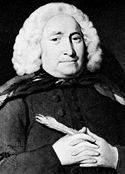
Thomas Chubb
Encyclopedia

English people
The English are a nation and ethnic group native to England, who speak English. The English identity is of early mediaeval origin, when they were known in Old English as the Anglecynn. England is now a country of the United Kingdom, and the majority of English people in England are British Citizens...
lay Deist
Deism
Deism in religious philosophy is the belief that reason and observation of the natural world, without the need for organized religion, can determine that the universe is the product of an all-powerful creator. According to deists, the creator does not intervene in human affairs or suspend the...
writer, born near Salisbury
Salisbury
Salisbury is a cathedral city in Wiltshire, England and the only city in the county. It is the second largest settlement in the county...
.
Chubb regarded Christ as a divine teacher, but held reason to be sovereign in matters of religion, questioned religions' morality, yet was on rational grounds a defender of Christianity. He had no learning, but was well up in the religious controversies of the time.
Chubb wrote The True Gospel of Jesus Christ, Asserted wherein he stated that one must distinguish between the teaching of Jesus and that of the Apostles who wrote that the Gospels.
Chubb's views concerning free will and determinism, as expressed in his book A Collection of Tracts on Various Subjects (1730) was the subject of extensive criticism by Jonathan Edwards in his book Freedom of the Will (1754).
Works
He published tracts, one of which, The Previous Question with regard to Religion, went through four editions, three in 1725. They were collected in a quarto volume in 1730, and attracted wider notice. (A second edition, in 2 volumes which appeared in 1754 included 35 tracts.) Chubb was encouraged to write further tracts. A disciple of Samuel ClarkeSamuel Clarke
thumb|right|200px|Samuel ClarkeSamuel Clarke was an English philosopher and Anglican clergyman.-Early life and studies:...
, he gradually diverged from Arianism
Arianism
Arianism is the theological teaching attributed to Arius , a Christian presbyter from Alexandria, Egypt, concerning the relationship of the entities of the Trinity and the precise nature of the Son of God as being a subordinate entity to God the Father...
into a modified deism.
In 1731 he published a Discourse concerning Reason, … (showing that) reason is, or else that it ought to be, a sufficient guide in matters of Religion. Some ‘reflections’ upon ‘moral and positive duty’ were added, suggested by Clarke's Exposition of the Catechism. In 1732 he published The Sufficiency of Reason further considered … appended to an ‘enquiry’ directed against a recent sermon by Samuel Croxall
Samuel Croxall
Samuel Croxall was an Anglican churchman, writer and translator, particularly noted for his edition of Aesop's Fables.-Early career:...
, and urging that the celebration of Charles I's martyrdom was inconsistent with the celebration of William III's arrival.
In 1734 appeared four tracts, in which he attacks the common theory of inspiration
Biblical inspiration
Biblical inspiration is the doctrine in Christian theology that the authors and editors of the Bible were led or influenced by God with the result that their writings many be designated in some sense the word of God.- Etymology :...
, argues that the resurrection of Christ was not a proof of his divine mission, and criticises the story of Abraham's sacrifice of Isaac. The whole argument showed an increasing scepticism, and the argument about Abraham led to some controversy. He returned to the question in 1735 in some ‘Observations’ on Thomas Rundle's nomination to the see of Gloucester, Rundle having been accused of disbelieving the story. Three tracts are added in continuation of the former discussion.
In 1738 Chubb published ‘The True Gospel of Jesus Christ asserted,’ which provoked various attacks and was followed by ‘The True Gospel of Jesus vindicated,’ and ‘An Enquiry into the Ground and Foundation of Religion, wherein it is shown that Religion is founded on Nature.’ His doctrine is that true Christianity consists entirely in the belief that morality alone can make men acceptable to God, that repentance for sin will secure God's mercy, and that there will be a future retribution; three points upon which he constantly insists. In 1740 appeared an ‘Enquiry into the Ground and Foundation of Religion,’ including a controversy with Henry Stebbing
Henry Stebbing
Henry Stebbing was an English churchman and controversialist, who became archdeacon of Wiltshire.-Life:Baptised at Walton, Suffolk on 19 August 1687, he was the fourth son of John Stebbing , a grocer of Walton, by his wife Mary , daughter and coheiress of Richard Kenington...
. Chubb, arguing against the literal interpretation of the command to give all to the poor, observes that Stebbing has two livings, a preachership and an archdeaconry, and is now becoming chancellor of the diocese of Salisbury, and can therefore hardly interpret the command literally for himself.
In 1741 appeared a ‘Discourse on Miracles,’ arguing that they can at most afford a ‘probable proof’ of a revelation; in 1743 an ‘Enquiry concerning Redemption,’ in which he defends himself against some sneers of William Warburton
William Warburton
William Warburton was an English critic and churchman, Bishop of Gloucester from 1759.-Life:He was born at Newark, where his father, who belonged to an old Cheshire family, was town clerk. William was educated at Oakham and Newark grammar schools, and in 1714 he was articled to Mr Kirke, an...
's; and in 1745, ‘The Ground and Foundation of Morality considered,’ an attack on Thomas Rutherforth
Thomas Rutherforth
Thomas Rutherforth was an English churchman and academic, Regius Professor of Divinity at Cambridge from 1745, and Archdeacon of Essex from 1752.-Life:...
's theory of self-love. The last work Chubb published himself was ‘Four Dissertations’ (1746), in which he attacks some passages in the Old Testament with a freedom which gave wide offence.
External links
- Thomas Chubb, A Collection of Tracts on Various Subjects (London, 1730). On Google Books.

